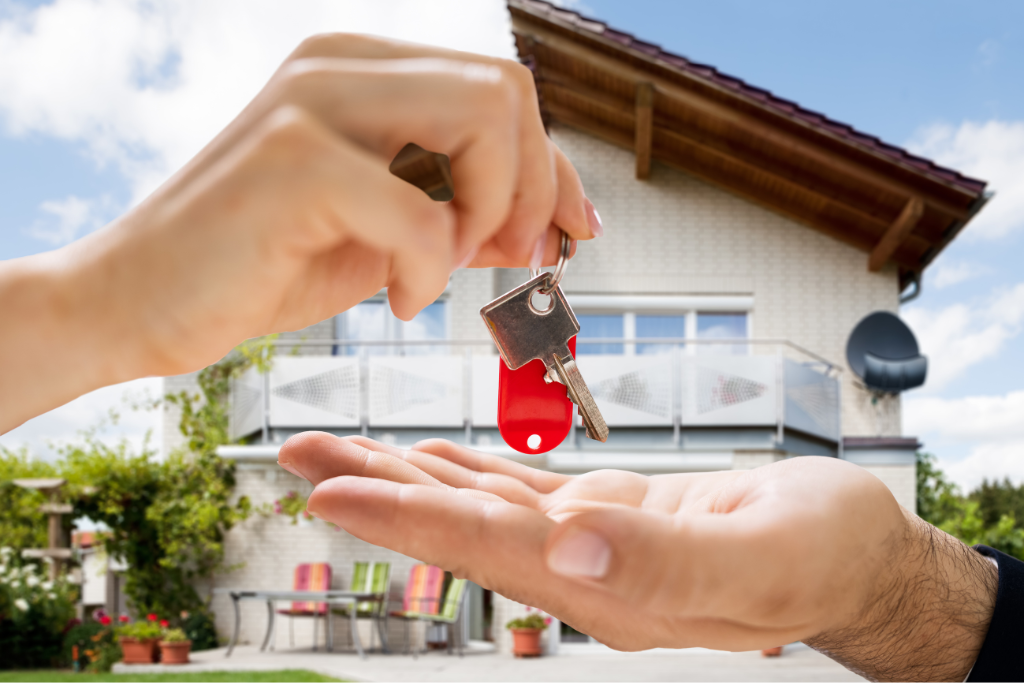
Do virtual house tours help sell houses & are they worth it UK?
Exploring the advantages & disadvantages of virtual house tours

Table of Contents
Imagine you’re scrolling through property listings, but instead of just pictures and descriptions, some let you virtually step inside and explore every room at your own pace. This is the magic of virtual house tours, and they’re changing the game in the UK’s housing market.
Only a decade ago, viewing houses meant scheduling appointments, driving around, and squeezing into crowded open houses. But with the rise of technology and a little help from a global pandemic, virtual tours have gone from a cool-extra to a must-have for luxury listings.
Now you can visit your dream home from the comfort of your living room, anytime you like. No need to worry about traffic or clashing schedules. Virtual tours let you get a feel for the space, get a glimpse of the neighbourhood and imagine yourself living there.
But are they all sunshine and rainbows? Well, not quite. The effectiveness of a virtual tour depends on the type of property and the quality of the tour itself. A low-quality tour might leave you feeling more confused than connected.
In this article, we’ll dive deep into the world of virtual house tours. We’ll explore their origins, effectiveness, and suitability for different properties. We’ll also unveil the secrets behind creating high-quality tours, promoting them effectively, and figuring out the costs involved.
What is a virtual house tour?
Imagine exploring a property from the comfort of your sofa, without ever leaving your home. That’s where virtual house tours come in. These tours are essentially digital representations of a property, allowing potential buyers or renters to explore the space online.
Virtual tour for houses are used to support other marketing activities when it comes to selling a house. They offer a three-dimensional house tour which can be viewed from any technological platform.
Why did virtual house tours become so popular?
The rise of virtual house tours can be attributed to several factors, including:
- During the COVID-19 pandemic, social distancing measures and restrictions on in-person interactions made homes with virtual tours an important tool.
- The growing trend towards remote work and living led to a demand for flexibility and convenience. Virtual tours allowed people to explore properties from anywhere in the world, eliminating geographical limitations.
- As technology evolved, so did virtual tours. High-quality 3D tours, 360-degree panoramic views, and even virtual reality experiences became readily available, offering a more realistic and engaging experience compared to earlier versions.
Overall, virtual house tours have become increasingly popular due to a combination of factors related to the pandemic, technological advancements, and changing consumer preferences. They offer convenience, flexibility and a glimpse into a property before ever stepping foot inside, making them a valuable tool for both buyers and sellers.
Are virtual house tours effective?
The effectiveness of virtual house tours largely depends on how well they are implemented and integrated into a comprehensive marketing strategy. While virtual tour for houses are not effective at increasing the selling price of a property, they are effective in attracting a wider pool of potential buyers.
They are a powerful tool for attracting interest and providing detailed information about a property, but they work best when complemented with other marketing efforts, including estate agent photography, detailed property description and the option for in-person viewings or open days.
In markets where competition is fierce, or where buyers are likely to be remote, virtual tours can significantly increase a property’s appeal and help it sell more quickly.
Are virtual tours more effective for certain types of properties than others?
While virtual house tours offer a valuable tool for most properties, they can be particularly advantageous for specific property types like high end properties, properties with unique features and remote properties.
Luxury homes often have intricate features, expansive spaces and overall grandeur which can be showcased effortlessly through the immersive nature of virtual tours. Viewers can appreciate the details like high-end finishes, elaborate architecture, and spacious layouts, creating a more compelling experience compared to static photos.
Virtual house tours mean properties with unique features can be shown in their best light. This could include intricate details like custom designs, historical elements, or quirky architectural features to be highlighted, captivating potential buyers interested in something distinctive.
Virtual tours also mean that potential buyers can overcome location limitations, as virtual tours bridge the geographical gap attracting buyers who might not have the opportunity to visit in person. This opens up a wider pool of potential buyers and expands the reach of the property’s marketing efforts.
Are virtual apartment tours effective?
Virtual apartment tours have revolutionised the apartment hunting process, offering numerous benefits for both renters and property managers. In today’s fast-paced and technology-driven market, they are becoming an increasingly essential tool.
Here’s a breakdown of their effectiveness:
Potential renters can explore apartments anytime, anywhere, eliminating the need to schedule inconvenient in-person visits. This empowers busy individuals and out-of-towners to participate in the search effectively.
Virtual tours expand your reach beyond local renters, attracting individuals relocating from other counties or countries. This significantly increases your applicant pool.
By allowing pre-screening online, virtual tours save time and resources for both parties. Property managers can focus on serious applicants, and renters only visit properties they are genuinely interested in.
Virtual tours encourage interested individuals to self-select. Those requesting in person viewings are likely more serious about proceeding, leading to a smoother leasing process.
When are virtual tours not effective at selling properties?
While virtual tours offer a powerful tool for many properties, they may not be as effective in some specific situations like simpler layouts, potential structural issues, emotionally driven purchases and limited target audience.
For small or straightforward floor plans, high-quality photos and detailed floor plans might be sufficient for potential buyers to grasp the space effectively. In such cases, a virtual tour may be redundant and unnecessary.
If a property has visible flaws, structural issues or significant need for repairs, a virtual tour could unintentionally highlight these problems and deter potential buyers who might have considered an in-person viewing with the possibility of overlooking some issues.
Properties targeting first-time buyers or family-oriented buyers often elicit emotional connections beyond the practical aspects. Virtual tours while showcasing features might struggle to capture the unique atmosphere, charm or personal connection potential buyers seek in these scenarios.
Finally, if your target demographic consists of individuals less comfortable with technology or who prefer traditional approaches, virtual house tours might not hold the same appeal and could even deter them from considering the property.
Virtual tours are a valuable pre-screening tool, helping potential buyers quickly assess properties and prioritise their viewing list. However, they should not be viewed as a complete replacement for in-person visits that allow for experiencing the space firsthand and making informed decisions.
Sell your house the easy way
What are the different forms of virtual house tours?
| Type of tour | Pros | Cons | Usage in selling houses |
|---|---|---|---|
| 360 Degree views | Allows comprehensive exploration of property spaces. The user controlled navigation enhances engagement. | May require high internet bandwidth. Can be less intuitive for non-tech savvy users. | Effective for detailed online listings. Enhances website engagement and can attract a wider audience. |
| Video walkthroughs | Simulates the experience of physically walking through the property. Can be narrated to highlight key features. | Viewers cannot control the pace or direction of the tour. Production can be time-consuming and costly. | Useful for social media, marketing and email campaigns. Offers a quick overview that can appeal to busy buyers. |
| Interactive elements | Engages users with clickable information points. Can include floor plans and measurements for detailed understanding. | May require more complicated software and web integration. Overloading with elements can overwhelm users. | Enhance online listings with detailed insights.Can be used in email marketing to provide interactive content. |
| Virtual reality (VR) | Offers a highly immersive experience. Allows for a realistic sense of space and layout. | Requires VR headsets, which may not be widely available. Higher production costs. | Premium showcasing tool for high-end properties. Ideal for international or distant buyers unable to visit in person. |
What are typical virtual house tour costs (£)?
The cost of creating a virtual house tour in the UK can range widely, depending on the tour’s complexity and the professional services employed. Basic 360-degree tours might start from as little as £100 for smaller properties, while more sophisticated immersive or VR tours can cost upwards of £500 to £1,000, especially for larger or more luxurious properties.
The investment in a virtual tour should be considered in the context of the overall marketing strategy and the potential return on investment it offers by attracting more interested and qualified buyers.
Are visual tours worth it?
While virtual property tours have become increasingly popular in the UK housing market it’s important to understand their nuanced effects. A recent study by Isamar Tronsco, an expert at Harvard Business School, analysed over 75,000 home sales and found that in the US virtual tours didn’t significantly impact sale prices.
Tronsco’s research found that while virtual tours enhanced the listing quality, increased the screening efficiency of buyers and added competitive advantage, virtual house tours failed to increase the selling price of houses.
Virtual tours were proven to enhance the presentation of properties by showcasing their layout and features effectively and attracted more interested buyers. They also allowed potential buyers to efficiently rule out properties that didn’t meet their needs, saving time and effort compared to in-person visits.
In areas where properties were less in demand, or the estate agency was smaller, virtual tours added a competitive advantage by increasing online visibility and attracting a wider audience.
But, the research suggests there was minimal impact on sale prices, with houses still needing high-quality photos and detailed descriptions in order to sell effectively.
What are the disadvantages of virtual house tours?
Virtual house tours, while innovative and increasingly popular, especially in the context of real estate marketing and remote viewing options, come with their own set of disadvantages. Some of the most notable drawbacks include:
Virtual tours cannot fully convey the tactile, olfactory and subtle audio-visual nuances of a physical space, which can be important for decision-making.
Quality depends on technology used, requiring viewers to have a stable internet connection and potentially specific hardware/software, leading to potential glitches or poor image quality.
Pre-recorded or static tours lack the real-time interaction of physical tours, hindering immediate clarification or personalised insights from estate agents.
Camera angles and lens distortion can create unrealistic expectations by making spaces appear larger or smaller than they are in reality.
Virtual tours may not highlight potential issues or finer details, like wear and tear, that a buyer would notice during a physical walkthrough.
Hosting tours online can expose properties and personal belongings to potential security risks and privacy concerns.
Not everyone is comfortable using or has the capability to navigate virtual tours, potentially creating barriers for some buyers, including the elderly or individuals with disabilities.
The impersonal nature of virtual tours can limit the emotional connection potential buyers might develop with a property, hindering their ability to envision themselves living there.
What are the benefits of creating a virtual house tour?
Virtual house tours were very helpful during the pandemic where people couldn’t physically visit properties. And, to some extent, they still have many benefits post pandemic:
Virtual house tours provide a more immersive and engaging experience for potential buyers compared to static photos. This can showcase your property’s layout, features and best aspects more effectively, potentially attracting more interested buyers.
Virtual tours can be readily shared online, allowing you to reach a wider audience of potential buyers, including those located further away or unable to visit in person. This can increase exposure and generate more interest in your property.
Virtual tours can act as a pre-screening tool, allowing potential buyers to virtually explore the property and rule out options that don’t meet their needs. This can save time and effort for both you and potential buyers.
In areas where the demand is low, offering a Virtual tour for houses can set your property apart from competitors and give you an edge in attracting buyers.
Experience industry leading property marketing
How do I make a virtual tour of my house?
In order to make a virtual tour of your own house, there are a few different methods you could look at. The first would be to hire a professional videographer with specialised equipment like a 360-degree camera that can offer the highest quality and most immersive experience possible – but this will come at a cost.
The more budget friendly option would be to explore DIY methods like purchasing or renting a 360 degree camera yourself, which could capture a panoramic view of your surroundings, allowing viewers to virtually navigate the space. Good 360-degree camera brands include Ricoh Theta, Insta360 and Samsung Gear 360.
Or, the even more budget friendly option is to use a smartphone app that offers virtual tour creation functionality. Good examples of virtual house tour apps include Matterport Capture, iStaging Spaces and Cupix. These apps will have limitations compared to dedicated cameras but can be a good, low cost, starting point.
The quality of your virtual tour will depend on the method you choose and your willingness to invest time and effort. Research different options, consider your budget and desired level of quality, and choose the approach that best suits your needs.
How do you film a virtual tour?
In order to capture the footage for your virtual house tour, you will want to capture each room from different angles, aiming for an excellent representation of the space. You will want to maintain a slow and steady pace, avoiding jerky movement while filming.
When you are editing the footage, you may wish to add a narration over the top of the video, talking through the key points of the property, like you would at a house viewing.
How do you market a virtual house tour?
While many estate agents handle virtual tour marketing on behalf of sellers, understanding the process can be beneficial. Here’s a breakdown of key strategies:
Estate agents usually list your property on portals like Rightmove and Zoopla, including a compelling thumbnail image or video snippet to grab attention and encourage viewers to click on the detailed description highlighting the virtual tour’s benefits.
The estate agent should share the virtual tour link on their social media platforms (Facebook, Instagram, Twitter) with engaging captions sparking curiosity and interest. Consider targeted social media advertising (often an additional cost) to reach specific audiences or locations most likely to be interested in your property.
Some estate agents may use email marketing platforms like Salesforce, Klaviyo, or Mailchimp to share the virtual tour link with their existing customer database and potential buyer pool. This expands your reach by leveraging existing connections.
Can The Property Selling Company help with virtual tours?
Yes, we can help you with virtual house tours, but it depends on the specific property and our assessment of its needs. While professional estate agent photography and floor plans are always included in our service, virtual tours are offered selectively based on the property.
Here’s what we do:
- Consult with you: We discuss your property and explore all other routes to sale, before determining if a virtual tour could be beneficial in attracting potential buyers.
- Professional photography and floor plans: We always provide these essentials as part of our standard service to showcase your property effectively.
- Virtual tours considered strategically: We may use our own Regional Managers to film a basic virtual tour if deemed appropriate for your property. Alternatively, for high-value properties or those requiring a higher level of immersion, we can arrange for a professional filming team to create a premium virtual tour experience.
We believe that this approach ensures that you receive the most suitable visual marketing strategy for your specific property, optimising its potential within our budget and yours.
Do virtual house tours help sell houses?
Virtual house tours are an interesting tool within the estate agency arsenal, offering both opportunities and limitations when it comes to selling houses. They are a tool that, when used effectively, can significantly enhance the visibility and appeal of a property, attracting more potential buyers and increasing engagement with the property listing.
These tours can speed the sales process by filtering out less interested parties, allowing only the most serious buyers to proceed to in-person house visits. However, it’s important to temper expectations regarding their direct impact on sales prices or the guarantee of a sale.
While they can be a powerful marketing tool, virtual house tours alone are unlikely to command a higher price or ensure a sale without the element of luck.
The debate among property experts is ongoing, with some citing that homes with virtual tours can generate up to 49% more qualified leads. This statistic highlights the tours’ potential to draw in a significant number of interested buyers.
Yet, it’s important to recognise that a high interest level does not automatically translate into actual sales. The number of qualified leads – a measure of potential buyer interest – does not directly indicate the number of converted transactions.
The most effective strategy for selling a house in today’s market involves a multi-channel approach. This means leveraging a mix of traditional and digital marketing tactics, including professional photography, detailed floor plans, strategic social media marketing, targeted email campaigns and yes, the incorporation of virtual tour for houses.
By utilising a broad spectrum of marketing tools, sellers can maximise their property’s exposure and appeal, attracting a wide range of potential buyers and increasing the likelihood of a successful sale.
Virtual tour help sell houses: FAQs
How are virtual house tours created?
Technology plays an important role in creating a virtual experience. From basic 360-degree photographs that let you spin around in a room, to immersive video walkthroughs, and even virtual reality experiences that transport you right into the space, these tours offer a range of options for exploration.
How long does it take to create a virtual tour?
A basic 360-degree virtual tour of a modest-sized property might be completed in a few hours, whereas a more indepth and immersive tour, especially for larger properties, could take several days to capture and compile. The editing and software processing time must also be considered, adding to the overall time frame from conception to completion.
How will homes with virtual tours be promoted to potential buyers?
Promotion of homes with virtual tours are typically integrated into a broader real estate marketing strategy. They are showcased on property listing websites, social media platforms, and real estate agents’ websites, ensuring maximum visibility to potential buyers.
Email marketing campaigns can also be effective, sending direct links to the virtual tour to a curated list of potential buyers. In addition, QR codes linking to the tour can be included in printed brochures or signage, offering an instant digital experience to those exploring physical marketing materials.
We can help you sell in as little as 28 days





